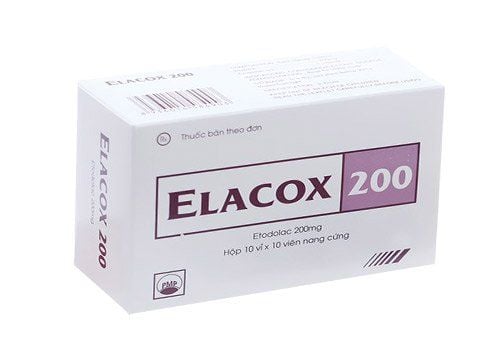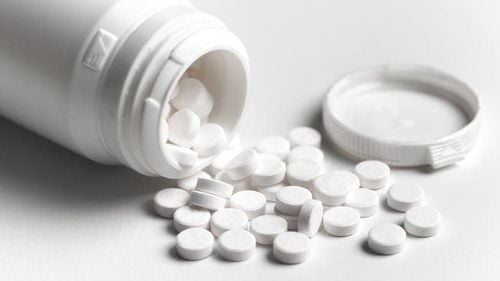This is an automatically translated article.
With the main ingredient is Etodolac 200mg, Batilead is used to relieve pain effectively in cases of osteoarthritis, dysmenorrhea, post-operative pain... So what drug is Batilead? What does Batilead do? What is the correct way to drink? The following article will help you better understand the use of Batilead medicine.
1. What are the uses of Batilead?
1.1. What is Batilead? Batilead drug has the ingredient Etodolac 200mg, is made in the form of hard capsules (silver brown - silver pink). Batilead is packaged in a box of 3 blisters, 10 blisters, each blister of 10 tablets and in bottles of 30 tablets, bottles of 60 tablets, bottles of 100 tablets. Batilead is a product of Phuong Dong Pharmaceutical Joint Stock Company - VIETNAM - Phuong Dong Pharmaceutical Joint Stock Company
1.2. What are the uses of Batilead? Batilead drug has the main ingredient Etodolac 200mg used to treat osteoarthritis, acute gout attacks or pseudogout. Patients with pain after tooth extraction, postoperative pain, pain after episiotomy, dysmenorrhea, acute musculoskeletal pain due to many causes.
2. How to use the drug Batilead
2.1. How to use Batilead Drugs or pharmaceuticals are manufactured by companies in the form corresponding to the forms of use, the route of administration is different. The usual routes of administration are: oral, injectable, topical, and suppository. Patients should carefully read the instructions on how to take Batilead as indicated on the instruction sheet of the drug, patients must not arbitrarily use the drug by other routes not specified in the instruction sheet of the drug Batilead.
Batilead is a tablet that should be taken orally, so patients need to take it during or after meals. Use Batilead at the lowest effective dose and for the shortest possible time to minimize unwanted effects.
2.2. Dosage of the drug Batilead Usual dose: 400 mg per day, taken between meals. Adults: Osteoarthritis or gout, maximum total dose 1200 mg per day. If the patient is under 60 kg, the total dose should not exceed 20 mg per kg per day. Pain in dentistry: 1 tablet per time and from 3 to 4 times a day. Extensor tendonitis, bursitis, elbow fasciitis, tenosynovitis, pain after episiotomy: 2 capsules per use 2 to 3 times a day. Children: Not recommended for use in children under 18 years of age. Elderly: Usually no dose adjustment is required in elderly patients. The elderly are often at increased risk of serious side effects. When it is absolutely necessary to take Batilead, the risk of gastrointestinal bleeding should be regularly monitored during NSAID therapy. Management of missed dose: If the patient forgets a dose of Batilead, take it as soon as possible after remembering. However, if it is too close to your next dose, skip the missed dose and take your next dose at the scheduled time. Patients should be careful not to double the prescribed dose.
Management of overdose: Symptoms of an overdose of Batilead include headache, nausea or vomiting, epigastric pain and gastrointestinal bleeding, diarrhea, disorientation, irritability, and coma. , drowsiness or dizziness, ringing in the ears, fainting, seizures. Severe overdose of Batilead can lead to acute kidney failure and liver damage. Treatment: Treat symptoms and provide support. Within 1 hour of an overdose of Batilead, consider using activated charcoal. For adults, gastric lavage can be carried out within 1 hour when an overdose of Batilead is life-threatening. Ensure diuresis and monitor renal function. Patients should be monitored for at least 4 hours after overdose.
3. Contraindications of Batilead
3.1. Contraindications Hypersensitivity to Batilead containing etodolac or any other excipients of the drug. Patients with a history of asthma, urticaria or other allergic-type reactions after taking aspirin or other non-steroidal anti-inflammatory agents. Severe liver failure and severe kidney failure. Children under 15 years of age, as safety and efficacy in children have not been established. Women who are pregnant in the last 3 months of pregnancy and women in the breastfeeding period. Renal function and urinary excretion should be closely monitored in patients with heart failure, liver disease, chronic renal failure, or patients taking diuretics. The hemoglobin and hematocrit should be checked periodically for signs of anemia, which can sometimes occur in patients taking non-steroidal anti-inflammatory drugs. Patients receiving the drug may give a false-positive reaction for bilirubin - urine due to the presence of phenolic metabolites of etodolac in the urine. 3.2. Drug interactions Stomach antacids may decrease blood levels of etodolac. Concomitant use with aspirin and other non-steroidal anti-inflammatory drugs increases the effect of the drug. Co-administration with warfarin reduces the protein binding of warfarin. Etodolac when used with cycloserin, digoxin, lithium, methotrexate will reduce the clearance of these substances and increase toxicity. Effects of drugs on driving and operating machines: Etodolac can cause dizziness, drowsiness, fatigue, visual disturbances. Therefore, the patient should not drive or operate machinery, work at height or otherwise.
Pregnancy: There have been reports of birth defects with the use of nonsteroidal anti-inflammatory drugs (NSAIDs) in humans. However, the frequency is low and does not seem to follow a clear pattern. Due to the known harmful effects of NSAIDs on the fetal cardiovascular system (risk of premature closure of the ductus arteriosus), their use during the third trimester of pregnancy is contraindicated. Delaying or prolonging labor and delivery and increasing the risk of bleeding for both the mother and the newborn can occur. NSAIDs should not be used during the first and second trimesters of pregnancy or labor unless the potential benefit outweighs the potential risk to the fetus.
Lactation: NSAIDs may be excreted in very low concentrations in breast milk. The safety of etodolac in breastfeeding women has not been established at this time. If possible, the use of etodolac should be avoided in nursing women.
4. Notes when using the drug Batilead
Undesirable effects can be minimized by using the lowest effective dose for the shortest time. Batilead should be used with caution in patients with existing or pre-existing asthma, as NSAIDs can cause bronchospasm in these patients. Administration of Batilead causes a dose-dependent decrease in prostaglandin formation and may precipitate renal failure. Low doses should be used and renal function monitored in high-risk patients including: renal failure, heart failure and liver dysfunction, those taking diuretics or in the elderly. Use caution when using Batilead in patients with edema or hypertension, heart failure. Liver function, renal function and hematological parameters should be checked regularly in patients on long-term use of the drug. Drugs that inhibit prostaglandin biosynthesis may affect platelet function. Batilead should be used with caution in patients who may be adversely affected by inhibition of platelet function. There is an increased risk of adverse events in the elderly, especially gastrointestinal bleeding or perforation, which can lead to death. There is no need to adjust the dose of etodolac in the elderly, however, caution should be exercised in its use, especially during the period of increasing dose. Safety and effectiveness have not been demonstrated in children under 18 years of age, so the drug should not be used in these subjects. Cardiovascular and cerebrovascular effects: Fluid retention and edema have been reported with the use of NSAIDs, caution should be exercised in patients with a history of hypertension or mild to moderate congestive heart failure. Consider carefully before using Batilead in patients with uncontrolled hypertension, congestive heart failure, ischemic heart disease, peripheral artery disease, or cerebrovascular disease. Caution is advised before long-term treatment in patients with cardiovascular disease risk factors.
Gastrointestinal bleeding, ulceration, or perforation
Gastrointestinal risk is higher in high-dose NSAID users, with a history of ulceration, perforation, or gastrointestinal bleeding, and in the elderly. It is advisable to start with the lowest possible dose, concomitantly with gastroprotective agents. NSAIDs should be used with caution in patients with a history of gastrointestinal diseases (ulcerative colitis, Crohn's disease), as exacerbation of these conditions may occur. Caution should be exercised in patients receiving concomitant medications that increase the risk of ulceration or gastrointestinal bleeding such as oral corticosteroids, anticoagulants (warfarin), selective serotonin reuptake inhibitors or antiplatelet agents. aspirin). Increased risk of aseptic meningitis in patients with systemic lupus erythematosus and mixed connective tissue disorders. Discontinue use of Batilead at the first manifestation of skin rash, mucosal lesions or other signs of hypersensitivity. Batilead may affect fertility and is not recommended for use in women planning a pregnancy. Do not use the drug in women who have difficulty getting pregnant or are infertile.
5. Side effects of the drug Batilead
The most common undesirable effects when using Batilead are in the gastrointestinal tract. In addition, some other side effects also include:
Blood and lymphatic system such as: thrombocytopenia, neutropenia, agranulocytosis, non-regenerative anemia, hemolytic anemia. Immune system such as: Anaphylactic reaction, anaphylactic shock. Respiratory reactions include: asthma, which can aggravate asthma and bronchospasm, difficulty breathing. Skin disorders include: skin rash, pruritus or urticaria, purpura and angioedema, blistering exfoliative skin disease (toxic epidermal necrolysis, erythema multiforme). Neurological: Depression, headache, dizziness, insomnia, confusion, hallucinations, disorientation, paresthesia, tremor, weakness, nervousness, somnolence, aseptic meningitis (especially in patients with tangles) autoimmune disorders such as systemic lupus erythematosus, mixed connective tissue disorders) with symptoms such as stiff neck, headache, nausea, vomiting. Eyes: Visual disturbances, optic neuritis. Ears and labyrinths: Tinnitus, dizziness. Cardiac: Edema, hypertension, palpitations, heart failure. Some NSAIDs (especially with long-term, high-dose use) may slightly increase the risk of arterial thrombosis. Vascular: Vasculitis. Gastrointestinal: Gastrointestinal ulceration, perforation or bleeding, sometimes fatal, especially in the elderly. Nausea, vomiting, diarrhea, dyspepsia, epigastric pain, mouth ulcers, abdominal pain, constipation, flatulence, vomiting blood, black stools, peptic ulcer, dyspepsia, heartburn, bleeding rectal. Exacerbation of colitis and Crohn's disease. Gastritis, pancreatitis. Hepatobiliary: Liver dysfunction, hepatitis, jaundice. Skin and connective tissue: Stevens-Johnson syndrome, toxic skin necrosis syndrome (very rare). Sensitive to light. Renal and urinary: Dysuria, urinary frequency, nephrotoxicity (interstitial nephritis, nephrotic syndrome, renal failure). Body as a Whole: Body weakness, fatigue, malaise, chills, fever. Patients need to inform the doctor about the unwanted effects encountered when using the drug to promptly adjust and handle.
6. How to store Batilead
Store in a cool, dry place, at room temperature not exceeding 30°C, in the original packaging and out of direct light. Keep out of reach of children and pets. The concentration, content or active ingredient of Batilead can be very easily affected if the drug is not stored well, or when the expiry date is expired, it may cause harm to the user when using. Users should carefully read the storage information for Batilead and the drug expiration date listed on the product packaging and the instruction sheet for Batilead before using. When medication is past its expiration date or cannot be used, consult your doctor, pharmacist or garbage disposal for a safe way to dispose of it. With the main ingredient is Etodolac 200mg, Batilead is used to effectively relieve pain in cases of osteoarthritis, dysmenorrhea, postoperative pain... To ensure effective treatment and avoid unwanted side effects, Patients should strictly follow the instructions of the doctor or pharmacist.
Follow Vinmec International General Hospital website to get more health, nutrition and beauty information to protect the health of yourself and your loved ones in your family.
Please dial HOTLINE for more information or register for an appointment HERE. Download MyVinmec app to make appointments faster and to manage your bookings easily.













